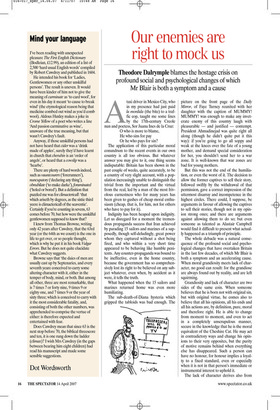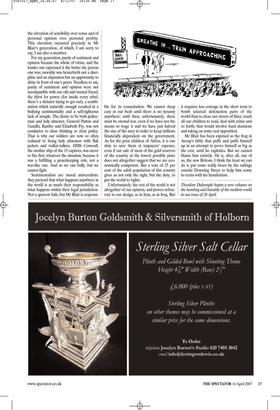Our enemies are right to mock us
Theodore Dalrymple blames the hostage crisis on profound social and psychological changes of which Mr Blair is both a symptom and a cause Ataxi driver in Mexico City, who in my presence had just paid la mordida (the bite) to a traffic cop, taught me some lines by the 17th-century Creole nun and poetess, Sor Juana Ines de la Cruz: O who is more to blame, He who sins for pay Or he who pays for sin?
The application of this particular moral conundrum to the recent events in our own country is all too obvious. But whatever answer you may give to it, one thing seems indisputable: Britain has been shown in the past couple of weeks, quite accurately, to be a country of very slight account, with a population increasingly unable to distinguish the trivial from the important and the virtual from the real, led by a man of the most frivolous earnestness who for many years has been given to gushes of cheap moral enthusiasm (cheap, that is, for him, not for others who have to pay for it).
Indignity has been heaped upon indignity. Let us disregard for a moment the tremendous propaganda success that Iran achieved by parading 15 sailors and marines of a supposedly, though self-deludingly, great power whom they captured without a shot being fired, and who within a very short time appeared to be behaving like humble penitents. Any counter-propaganda was bound to be ineffective, even in the home country, because the government has so comprehensively lost its right to be believed on any subject whatever, even when, by accident as it were, it tells the truth.
What happened when the 15 sailors and marines returned home was even more humiliating.
The sub-death-of-Diana hysteria which gripped the tabloids was bad enough. The picture on the front page of the Daily Mirror, of Faye Turney reunited with her daughter with the caption of MUMMY! MUMMY! was enough to make any inveterate enemy of this country laugh with pleasurable — and justified — contempt. President Ahmadinejad was quite right all along (though he didn’t quite put it this way): if you’re going to go all soppy and weak at the knees over the fate of a young mother, and demand special consideration for her, you shouldn’t send her to a war zone. It is well-known that war zones are bad for young mothers.
But this was not the end of the humiliation, or even the worst of it. The decision to allow the former captives to sell their story, followed swiftly by the withdrawal of that permission, gave a correct impression of the uttermost disarray and incompetence in the highest circles. There could, I suppose, be arguments in favour of allowing the captives to sell their stories, though not in my opinion strong ones; and there are arguments against allowing them to do so; but even someone as talented as Alastair Campbell would find it difficult to present what actually happened as a triumph of principle.
The whole debacle was a natural consequence of the profound social and psychological changes that have overtaken Britain in the last few decades, of which Mr Blair is both a symptom and an accelerating cause. When moral grandiosity meets lack of character, no good can result: for the grandiose are always found out by reality, and are left squirming.
Grandiosity and lack of character are two sides of the same coin. When someone believes that he is born not with original sin, but with original virtue, he comes also to believe that all his opinions, all his ends and all his actions are, by definition, pure, moral and therefore right. He is able to change from moment to moment, and even to act in a completely unscrupulous manner, secure in the knowledge that he is the moral equivalent of the Cheshire Cat. He may act in contradictory ways and change his opinions to their very opposites, but the purity of motive remains behind when everything else has disappeared. Such a person can have no honour, for honour implies a loyalty to a fixed standard, even or especially when it is not in that person’s immediate or instrumental interest to uphold it.
The lack of character derives also from the elevation of sensibility over sense and of personal opinion over personal probity. This elevation occurred precisely in Mr Blair’s generation, of which, I am sorry to say, I am also a member.
For my generation, purity of sentiment and opinion became the whole of virtue, and the louder one expressed it the better the person one was; morality was henceforth not a discipline and an abjuration but an opportunity to shine in front of one’s peers. Needless to say, purity of sentiment and opinion were not incompatible with our old and trusted friend, the thirst for power (for inside every rebel, there’s a dictator trying to get out), a combination which naturally enough resulted in a bullying sentimentality and a self-righteous lack of scruple. The desire to be both policeman and lady almoner, General Patton and Gandhi, Rambo and Elizabeth Fry, was not conducive to clear thinking or clear policy. That is why our soldiers are now so often reduced to being lady almoners with flak jackets and walkie-talkies. HMS Cornwall, the mother ship of the 15 captives, was never to fire first, whatever the situation, because it was a fulfilling a peacekeeping role, not a war-like one. And so we can bully, but we cannot fight.
Sentimentalists are moral universalists: they pretend that what happens anywhere in the world is as much their responsibility as what happens within their legal jurisdiction. Not a sparrow falls, but Mr Blair is responsi ble for its resuscitation. We cannot sleep easy in our beds until there is no tyranny anywhere: until then, unfortunately, there must be eternal war, even if we have not the means to wage it and we have just halved the size of the navy in order to keep millions financially dependent on the government. As for the poor children of Africa, it is our duty to save them at taxpayers’ expense, even if our sale of most of the gold reserves of the country at the lowest possible price does not altogether suggest that we are economically competent. But a vote of 25 per cent of the adult population of this country gives us not only the right, but the duty, to put the world to rights.
Unfortunately, the rest of the world is not altogether of our opinion, and proves refractory to our design, as in Iran, as in Iraq. But it requires less courage in the short term to bomb selected defenceless parts of the world than to clear our streets of litter, teach all our children to read, deal with crime and so forth; that would involve hard decisions and taking on some real opposition.
Mr Blair has been exposed as the frog in Aesop’s fable that puffs and puffs himself up in an attempt to prove himself as big as the cow, until he explodes. But we cannot blame him entirely. He is, after all, one of us, the new Britons. I think the least we can do is put some teddy bears by the railings outside Downing Street to help him come to terms with his humiliation.



































































 Previous page
Previous page